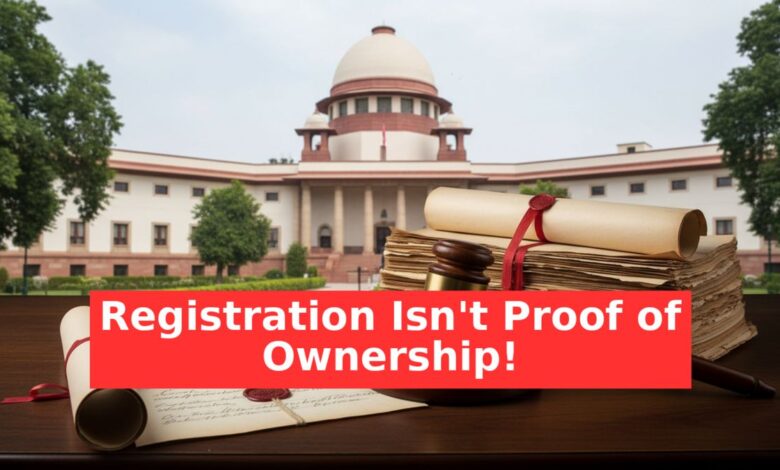New Land Rules: Supreme Court’s big verdict on land ownership! Are you the real owner with just registration? Know details

New Land Rules: In a landmark observation regarding property ownership, the Supreme Court has clarified that the registration of a document for the purchase of immovable property does not confer a guaranteed title of ownership. This registration merely serves as a public record of the transaction and holds presumptive evidentiary value, but it is never conclusive proof of ownership.
The two-Judge Bench, comprising Justice P.S. Narasimha and Justice Joymalya Bagchi, delivered this significant ruling. The case stemmed from a challenge to a Patna High Court judgment that had dismissed a Writ Petition challenging the validity of sub-rules (xvii) and (xviii) of Rule 19 of the Bihar Registration Rules, 2008, introduced through a 2019 amendment.
The Dichotomy Between Registration and Title
The Supreme Court bench explained that a long-standing dichotomy exists between ownership and registration in India’s legal system. According to the Bench:
- The Transfer of Property Act: Provides the substantive legal framework for the purchase and sale of immovable property.
- The Stamp Act: Imposes a fiscal charge on the property as a precondition for registration.
- The Registration Act: Institutionalizes the process of registering documents to create a public record of property transactions.
The Court emphasized, “The Registration Act mandates registration of documents, not the title. This distinction is the fundamental character of our country’s presumptive titling system. Thus, registration of a document… does not confer guaranteed title of ownership.”
The Bihar Registration Rules Controversy
An amendment in 2019 introduced two new sub-rules (xvii and xviii) to Rule 19 of the Bihar Registration Rules, 2008. These rules empowered registering authorities to refuse registration of a document if proof of mutation of the property in the vendor’s name was not produced. This requirement was challenged before the Supreme Court.
Supreme Court’s Observations and Verdict
In its observation, the Supreme Court noted that there is a significant “missing link” given that the processes of mutation, survey, and settlement are nowhere near completion. The Court stated:
- Under these circumstances, restraining registration until the jamabandi or holding allotment is completed is illegal, as it directly impacts the right and freedom to purchase and sell property.
- The Court also opined that any rule that impedes or restricts the easy and effective transfer of property is illegal because it has the direct effect of ‘depriving of property’.
- Therefore, the Court held that the requirement of producing jamabandi allotment as a pre-condition for registration under the impugned sub-rules 19 (xvii) and (xviii) is arbitrary and illegal, and consequently set them aside.
The Court further remarked that this system places a significant burden of due diligence on a prospective buyer, who must undertake a painstaking title search, often going back 30 years or more, and obtain a no-encumbrance certificate to ensure the property is free from legal liabilities.

